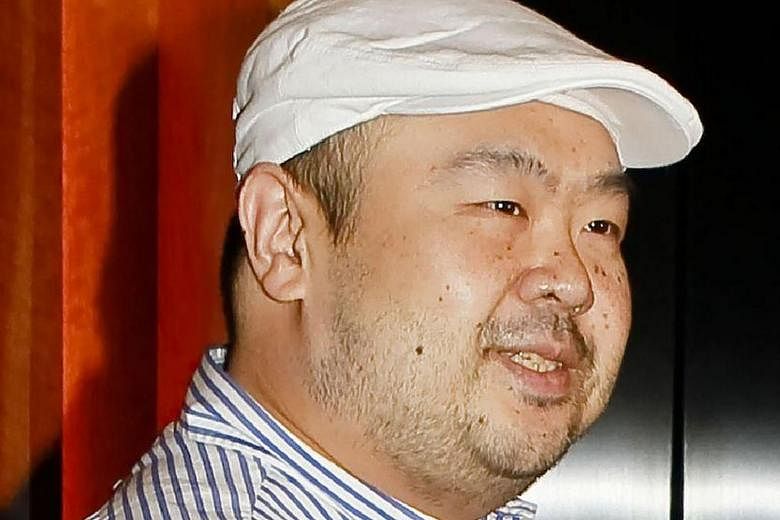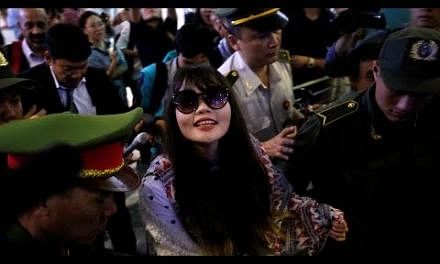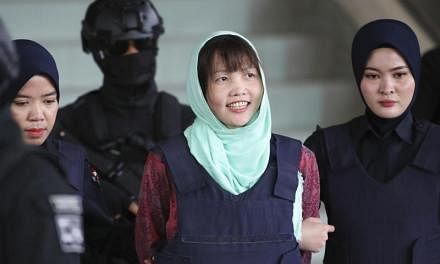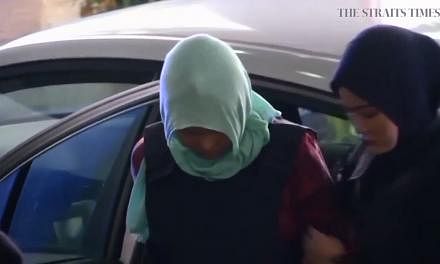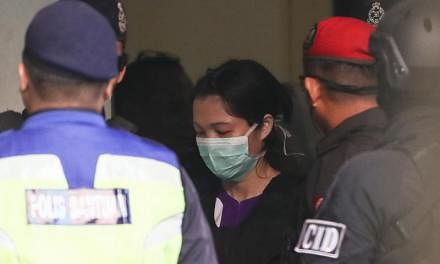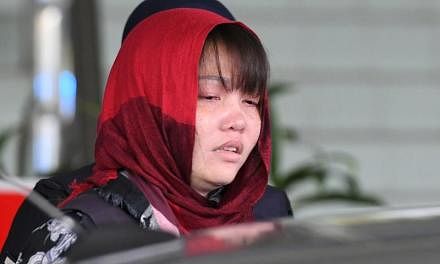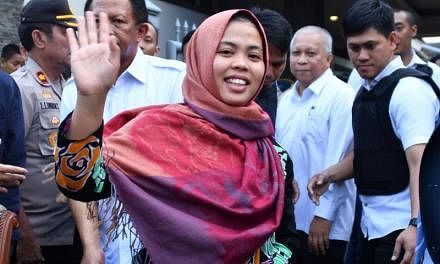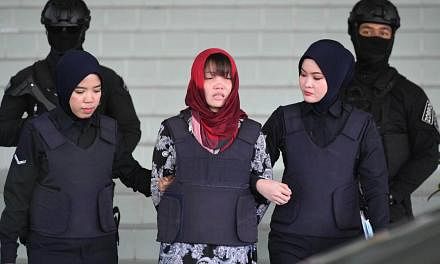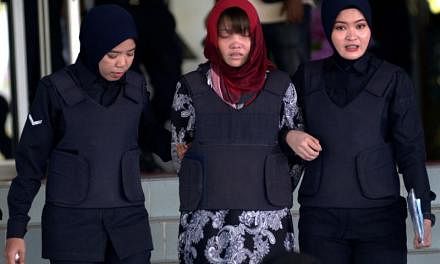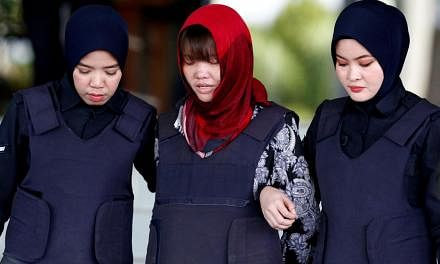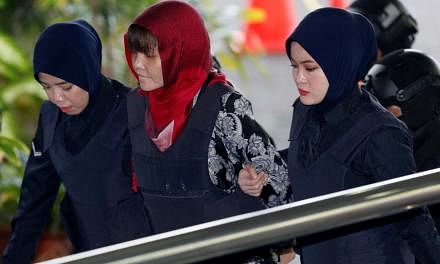It had all the ingredients of a juicy, sensational political thriller that the South Korean movie machinery is so good at producing.
Tyrannical dictator of secretive, nuclear-armed communist state sends female assassins to finish off Chinese-shielded estranged half- brother who just wants to live free, drink fine wine and hit the casinos.
A reported bloody shoot-out in 2011 between assassins and Mr Kim Jong Nam's bodyguards in Macau did not kill him. Neither did a foiled hit-and-run attempt a year earlier.
Finally, it took two women just five seconds to kill him in broad daylight, in a busy international airport, as he was about to board his flight. And they did it the old-fashioned way - death by poison.
"Very painful, very painful. I was sprayed liquid," Mr Kim told staff at an airport service counter just 15m from a self-check-in kiosk at the Kuala Lumpur International Airport (KLIA) departure hall at about 9am on Monday.
Those were his last words, as the poison took effect immediately, sending him into seizures at the airport clinic. He died on the way to the hospital.
He had been checking in for his flight back to Macau, which was home for much of the past 15 years, when two women approached him.
One stood in front of him to distract him. The other grabbed him from behind and either splashed or smothered him with a cloth laced with poison "more potent than cyanide", said the Malaysian police.
The bizarre murder of Mr Kim, 45, firstborn of the late North Korean leader Kim Jong Il, will likely one day be turned into a movie. But the pieces of this shocking puzzle are still being assembled even as political chess pieces are moving into place.
Mr Kim understood his life was always in danger since his half-brother, North Korea's reigning supreme leader Kim Jong Un, issued a standing order for his assassination after he took power in 2011, said South Korea's spy agency. The agency also said the older Kim sibling pleaded with his brother five years ago to spare him and his family.
Routinely labelled "ruthless" and "insecure", the younger Kim has ordered a number of executions of senior officials he deemed to be political threats. His own uncle, once believed to be the de facto leader as Mr Kim Jong Il battled with ill health, was executed in 2013.
"He knew his life was at risk... and he was aware his brother was after him," an unnamed friend of Mr Kim told the South China Morning Post.
Yet, all the older sibling wanted, it seems, was to lead a peaceful life with his family, doing the things he loved - enjoying fine French and Portuguese wines, hitting the slot machines in Macau's casinos and jetsetting to his favourite haunts in Paris, Kuala Lumpur and Singapore. His Facebook page, before it was deleted earlier this week, showed pictures of him on his travels to Europe and Asia, including Singapore. His "likes" included Girls Bar Kimidori in Orchard Plaza.
South Korean media say he had two wives and more mistresses in Singapore, Malaysia, Indonesia and Macau. Some reports say he could have sired as many as six children.
Mr Kim had publicly and privately said he had no interest in politics or taking over the world's most reclusive regime. Having attended school in Moscow, lived in Switzerland, and picked up French and English, he wanted the Hermit Kingdom to seek economic reforms and liberalisation modelled after China.
"He said that power should not depend on hereditary succession. That was not appropriate for a socialist society. The leader should be selected through a democratic process," Tokyo Shimbun senior writer Yoji Gomi, who regularly corresponded with him, told Agence France-Presse.
Born to his father's secret mistress, film actress Song Hye Rim, Mr Kim was said to have been doted upon by his father. After 10 years overseas, he returned to Pyongyang in the late 1980s and began holding positions in government, including at the Ministry of Public Security. He was also apparently managing some of the Kim family's finances, said to run into the billions, and was involved in shady dealings.
Meanwhile, another of the elder Kim's consorts Ko Yong Huo was busy priming her two sons for succession. One of them was a very young Jong Un.
That opportunity presented itself when Mr Kim put the family to shame after getting arrested in Tokyo with a fake Dominican Republic passport in 2001.
Even so, China considered him important enough to provide security, initially to keep him safe. He most likely traded favours by giving precious intelligence, say analysts. For China, Mr Kim served as an important back-up - in the event that the Kim Jong Un regime collapsed, he could be installed as the next leader.
But friends say he moved around without bodyguards in Macau, and he also appeared to be alone when he was poisoned at KLIA.
Conspiracy theories have swirled since the murder, and political jostlings become more deliberate.
Some initially speculated that the hit job could have been ordered by the Asian underworld.
But North Korean watchers believe, as salacious as the story is, Mr Kim Jong Un may not be directly behind the killing of his brother.
His half-brother presented no threat and was too far removed from the affairs of the regime, said Mr Michael Madden, a North Korean leadership expert and visiting scholar at the US-Korea Institute at Johns Hopkins University.
"There are other power players in Pyongyang who would have the institutional and financial means to order a contract killing of Jong Nam. They could do so because they want to ingratiate themselves with the supreme leader or conversely send him a message," Mr Madden told The Sunday Times.
"If Jong Un is trying to shore up relations with China, and there are people opposed to that, then they could send a message to Jong Un by killing his half-brother who was an asset to elements of China's intelligence community."
•Additional reporting by Chang May Choon in Seoul
